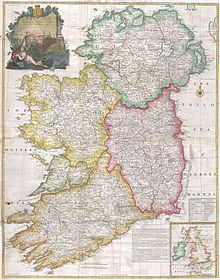| Revision as of 11:42, 11 February 2022 editLaurel Lodged (talk | contribs)Extended confirmed users66,338 edits Monarchy of the United Kingdom← Previous edit | Revision as of 11:45, 11 February 2022 edit undoLaurel Lodged (talk | contribs)Extended confirmed users66,338 editsNo edit summaryNext edit → | ||
| Line 3: | Line 3: | ||
| ] dating from the period of legislative independence (1782-1800)]] | ] dating from the period of legislative independence (1782-1800)]] | ||
| ] ]]] | ] ]]] | ||
| '''Grattan's Parliament''' refers to the period from 1782 to 1799 in the ] when the |
'''Grattan's Parliament''' refers to the period from 1782 to 1799 in the ] when the parliament achieved a greater degree of legislative freedom under the leadership of ]. The period is also known as the '''Constitution of 1782'''. Under the terms of ] of 1495, no law could be passed that was not first approved by the ]: "An Act that no Parliament be holden in this Land until the Acts be certified into England". The parliament was established by and subordinate to the ]. Along with other restrictions, it meant in effect, that the ] had control over the parliamentary agenda and authority to restrict its ability to legislate contrary to the objectives of the British government in London. From 1782, Grattan — the leader of the ] — led a series of legal changes which produced a period of novel legislative freedom. It also gave the parliament greater control over the ]. | ||
| The new constitutional arrangements proved short-lived in consequence of the ] by the ]. |
The new constitutional arrangements proved short-lived in consequence of the ] by the ]. By the ] the Parliament of Ireland was abolished. The ] was absorbed into the new ], with effect from 1 January 1801. | ||
| ==See also== | ==See also== | ||
Revision as of 11:45, 11 February 2022
| This article does not cite any sources. Please help improve this article by adding citations to reliable sources. Unsourced material may be challenged and removed. Find sources: "Constitution of 1782" – news · newspapers · books · scholar · JSTOR (April 2008) (Learn how and when to remove this message) |


Grattan's Parliament refers to the period from 1782 to 1799 in the Parliament of Ireland when the parliament achieved a greater degree of legislative freedom under the leadership of Henry Grattan. The period is also known as the Constitution of 1782. Under the terms of Poynings' Law of 1495, no law could be passed that was not first approved by the Parliament of England: "An Act that no Parliament be holden in this Land until the Acts be certified into England". The parliament was established by and subordinate to the Crown of England. Along with other restrictions, it meant in effect, that the Lord Lieutenant of Ireland had control over the parliamentary agenda and authority to restrict its ability to legislate contrary to the objectives of the British government in London. From 1782, Grattan — the leader of the Patriot Party — led a series of legal changes which produced a period of novel legislative freedom. It also gave the parliament greater control over the Royal Irish Army.
The new constitutional arrangements proved short-lived in consequence of the 1798 uprising by the United Irishmen. By the Acts of Union the Parliament of Ireland was abolished. The Kingdom of Ireland was absorbed into the new United Kingdom of Great Britain and Ireland, with effect from 1 January 1801.
See also
- Irish House of Commons
- Irish House of Lords,
- Irish Patriot Party
- Repeal of Act for Securing Dependence of Ireland Act 1782
- Irish Appeals Act 1783
| Major constitutional laws affecting Ireland | |
|---|---|
| Pre-Union |
|
| UK Acts |
|
| Constitutions |
|
| Oireachtas Acts |
|
| Treaties |
|